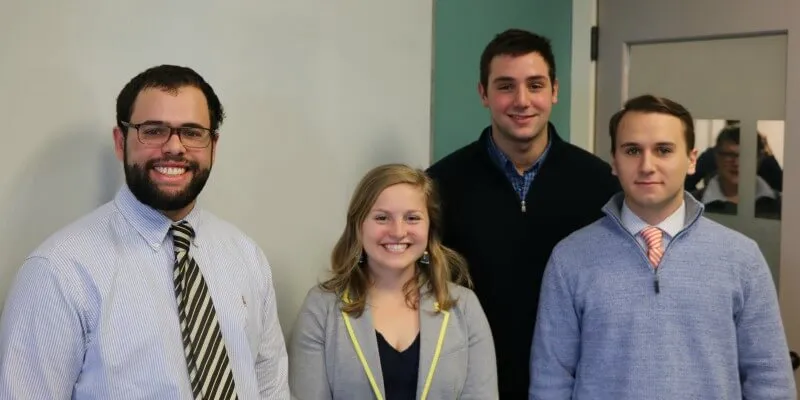When four UVM students took center stage at the Boston Federal Reserve offices on November 3rd, they had the full attention of New York Fed economists and staff experts on national monetary policy. The occasion was the fabled National Fed Challenge Competition, a sort of college World Series for undergraduate economists which gives participants a chance to make a 15-minute pitch for future Federal Reserve fiscal policy.
The quartet of UVM’ers proceeded to knock it out of the park, winning the morning completion in the Boston Regional Fed Challenge Competition and advancing to an afternoon round. In doing so they bested veteran teams from Northeastern, Dartmouth, Boston University and Bates College.
The team’s second presentation, this time to an audience of economic analysts, resulted in an overall third place finish in the region.
“Our students took on this challenge on top of their full course loads,” noted economics professor Jane Knodell, who served as faculty advisor and accompanied the team to Boston. “A lot of schools offer academic credit for participating in the Fed challenge—it’s a really a major time commitment.”
Team members, all of them seniors, spent up to twelve hours a week preparing as the competition approached, poring over economic data and Fed archives and presenting a dress rehearsal for students in the Lawrence Debate Union and faculty members in the economics department.
Teams were evaluated on demonstrating a knowledge of current economic conditions, understanding monetary policy, data and analysis, and teamwork.
“We got high grades for presenting a clear narrative,” said team member Rosie Steinberg. “Some of the other teams had around a dozen members, and presented a whole bunch of slides that highlighted the data behind their policy solutions. But we felt really good about making a strong and compelling story.”
The consensus among the UVM economists: the Fed should rid itself of excess reserves in the banking system, which currently includes an unprecedented percentage of mortgage-backed securities bought in the wake of the last recession, and gradually increase short-term interest rates to a target of 4% over the next five years.
“We don’t argue there will be a recession next year or the year after—we’re just pointing to the cyclical nature of the economy,” said another team member Jason Pollock. “We’re highlighting the importance of the Federal Reserve regaining their traditional means of influence to make sure they can effectively combat the next recession when it does happen.”
UVM’s participation in this year’s Fed Challenge was made possible through support from the The Skroback Fund for Excellence in Economics, provided by Andy Skroback ’58 and Barbara Skroback ’59.
